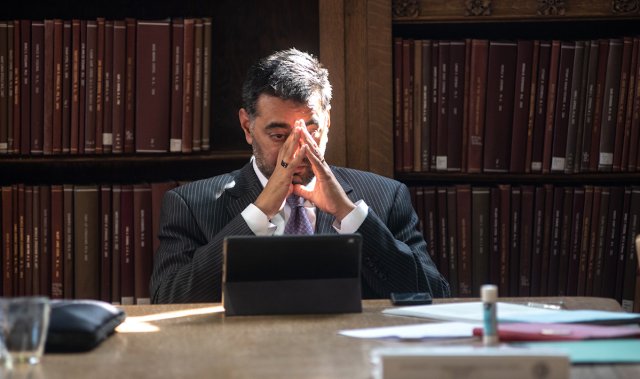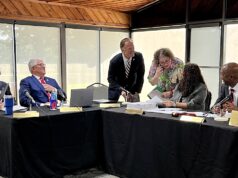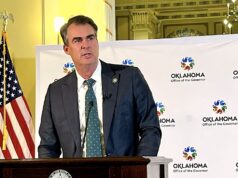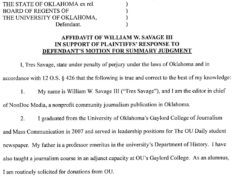
The University of Oklahoma will not be handling reports of campus sexual misconduct the way it used to.
OU’s Office of Institutional Equity announced a series of process changes in mid-August intended to put the university in compliance with revisions to federal Title IX law, which directs how sexual misconduct and discrimination allegations are investigated and adjudicated at universities receiving federal money.
The revisions also follow a 2019 letter from faculty leaders “concerned” about “vulnerabilities” at the OU Title IX Office. An internal audit of the Title IX Office and its processes was requested the same year.
Those documents (embedded throughout this story) were produced in the wake of several high-profile accusations of sexual misconduct, including an investigation into former OU President David Boren and former Vice President of Development Tripp Hall. The pair remain under examination by the Oklahoma State Bureau of Investigation, and the state’s multi-county grand jury reportedly heard testimony about Boren in early August.
Other reports of sexual misconduct among OU faculty have also involved high-profile employees. Former drama professor emeritus and donor John Scamehorn reportedly avoided formal investigation by agreeing to cut ties with OU in 2016. John Schwandt, the former director of OU’s American Organ Institute, left the university in 2019 after reports that at least six students and at least three faculty and staff had filed Title IX complaints against him. Drama professor Thomas Orr has been on administrative leave since January following the latest in years’ worth of misconduct allegations lodged against him.
In 2018 and 2019, some alleged victims of Boren, Hall, Scamehorn, Schwandt and Orr articulated that they believed OU’s Title IX Office was not handling accusations against the powerful men appropriately. The situations eventually drew criticism from the Faculty Senate Executive Committee and the Provost’s Advisory Committee for Women’s Issues.
On May 16, 2019, the two faculty organizations wrote the OU Board of Regents a letter outlining their concern about factors “undermining trust” in the office tasked with enforcing sexual misconduct protections required by federal law.
“In the past, the OU Title IX Office has been ineffective at building a reputation in the community for appropriately supporting claimants or reporting findings in a transparent manner, thus undermining trust in the office,” wrote then-Faculty Senate Chairman Joshua Nelson and then-PACWI Chairwoman Lee Fithian. “We are concerned that OU’s Title IX Office may not have had the resources available or the charge necessary to develop this ‘strong and visible’ role on campus and provide the necessary support and due diligence.”
Regents and OU President Joe Harroz appear to have listened, and in August 2019 Harroz announced the university was expanding sexual misconduct training and discrimination training while adding five new employees to the Institutional Equity Office and the Gender Equality Center.
“OU has a lot to be proud of in the performance of our Office of Institutional Equity,” Harroz said at the time. “But in this area, we must always keep improving and increasing the confidence level in our ability to address and support student needs and concerns.”
Following OU’s internal audit, administrative changes and the expansion of staffing within the Title IX Office, university leaders in 2020 would like to move on from the negative press associated with recent sexual misconduct scandals.
“As far as the past, it is just behind us. We are ready to move forward,” OU Board of Regents Chairman Gary Pierson said in late July. “We’ve dealt with those issues as best we can and within our power, and they’re the past. This Board of Regents is focused exclusively on the future.”
 Loading...
Loading...
The future of OU’s Title IX Office
What that future looks like for investigating and adjudicating campus sexual misconduct allegations was at least partially explained in an Aug. 14 email to faculty and staff about the Title IX policy revisions required under federal law.
Four primary changes to OU’s Title IX process were announced:
- The definition of “sexual harassment” has been clarified and includes the federal criminal definitions of sexual assault, dating violence, domestic violence and stalking. The definition includes unwelcome conduct “determined by a reasonable person to be so severe, pervasive and objectively offensive that it effectively denies a person equal access to the recipient’s education program or activity.” It also includes quid pro quo solicitation of unwelcome sexual conduct.
- During the OU Title IX Office’s “intake process,” those making sexual harassment complaints “will be informed of their options in filing a formal complaint, including supportive measures available, as well as information on a formal grievance process or an informal resolution process.”
- While they will still investigate complaints, the Title IX Office investigator will no longer be tasked with entering a finding of responsibility. Instead, a panel of “impartial decision-makers” will determine whether the accused party is found to be responsible after a live hearing, which is now a required part of the grievance process. The hearings will feature witness testimony and questioning, including cross-examination.
- If both parties to a formal complaint agree, they can pursue an “informal resolution process” facilitated by individuals outside of the Title IX Office.
Pierson and Harroz both said July 28 that the revisions and changes to the university’s Title IX Office and procedures will “absolutely” yield more robust checks and balances moving forward.
“We are going to comply with all the federal laws that relate to this area,” Pierson said. “We’ve completely revamped our systems and the people that are involved. Everybody needs a check and a balance of some sort, and so that’s part of the role the Board of Regents plays on behalf of the president.”
New leadership for OU’s Title IX Office

The changes described above are not the only new elements of OU’s Institutional Equity Office, which houses the Title IX Office.
In May, OU’s longtime equal opportunity coordinator and Title IX coordinator Bobby Mason departed OU for a newly created position of vice president for institutional compliance at Texas State University. Roughly 11 months earlier, emails obtained by NonDoc show Mason had asked Harroz for a promotion to a vice president position at OU. (The university has trimmed its extensive list of VP positions under Harroz and his predecessor, former President Jim Gallogly.)
“As you’re aware, I serve as the TIX coordinator, equal opportunity officer, and affirmative action officer with oversight over all three OU campuses,” Mason wrote June 17, 2019. “I believe this change (to a vice president position) would make a strong statement about our commitment to Title IX and equal opportunity. Additionally, I believe that the VP title would be a significant benefit when working on other campuses, when interacting with parents, and while representing the university in our interactions with OCR, OCRE, EEOC, OFCCP and other agencies. Please know that this isn’t a mandate and I fully understand the current campus climate and budget situation.”
The subsequent two lines of Mason’s email were redacted by the OU Open Records Office with a designation of Section 24.A.9 of the Oklahoma Open Records Act. That section of the law states that “a public official may keep confidential his or her personal notes and personally created materials other than departmental budget requests of a public body prepared as an aid to memory or research leading to the adoption of a public policy or the implementation of a public project.”
Harroz replied June 22: “Bobby, my apologies for the delay in responding. I will review and look forward to discussing.”
About nine months later, however, Mason became another of a dozen prominent male administrators to leave OU after the departure of Boren, who struck an agreement for six top vice presidents to receive retention bonuses as he was being asked to retire by the OU Board of Regents.
Mason, who did not return a message left with his Title IX Office at Texas State University, participated in OU’s investigation of Title IX complaints against Boren, which ultimately were compiled as part of the infamous and expensive Jones Day report. The only portion of that report to be released publicly so far indicated that “six witnesses” alleged some sort of potential misconduct by Boren, one of Oklahoma’s most powerful and influential political figures since the 1970s.
That document specifically analyzed the allegations against Boren made by OU graduate Jess Eddy, whom the law firm dubbed “generally credible” in his second interview on the matter.
“Mr. Eddy’s account of President Boren’s sexual advances is generally consistent with and similar to the accounts of others among The Six Witnesses — in particular the hotel room evenings described by SAIII and the President’s Office meetings described by SAXII,” the document noted.
In June 2019, Boren agreed to resign his emeritus teaching position with OU and relinquish his football tickets, office and parking space. The resignation was accepted by the university and OU regents as a conclusion to the Title IX sexual misconduct investigation into Boren.
Two months later, in August 2019, OU announced it would be adding three new employees to its Office of Institutional Equity, the parent organization of OU’s Title IX Office. The hirings followed the recommendations of Mason, which he detailed in a June 2019 memo he sent to Harroz (embedded below).
RELATED
OU interim Title IX officer Faustina Layne: ‘We can provide many types of relief’ by Tres Savage
“The OIE was created in 2012 in response to ever-increasing state and federal regulation governing equity issues. Since 2012 these regulations and requirements have continued to increase,” Mason wrote. “In 2016 the OIE assumed responsibility for receiving and responding to all reports of bias or prejudice behavior, physical or mental harassment, or unwelcome verbal or physical conduct, reported to the 24-hour reporting hotline.”
NonDoc obtained Mason’s memo and a series of emails through an open records request for information related to OU’s August 2019 press release titled: “OU expands university resources to address sexual misconduct and discrimination.”
As of the publication of this story, Mason is still listed as the Title IX and institutional equity officer across the bottom of several OU websites.
In late July, interim Office of Institutional Equity officer and Title IX Office coordinator Faustina Layne answered a series of questions from NonDoc, which have been published here.
May 2020 Title IX memo to OU regents
